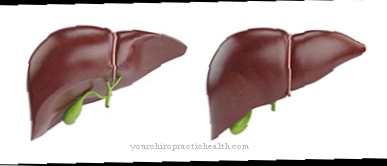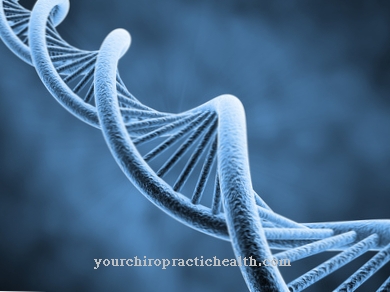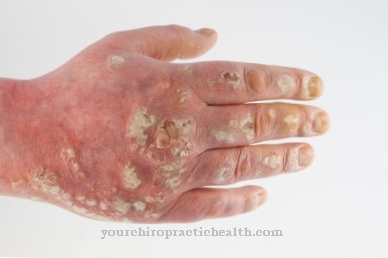Not every woman who comes to the gynecologist's pregnancy counseling or childbirth asks this question out loud. But unspoken it is on the tip of every mother-to-be, as is the question of whether it will be a boy or a girl. Concern for the well-being of the coming child becomes particularly urgent when a miscarriage or stillbirth or even a malformation (formerly also called a miscarriage) has to be complained about. And after all, almost all women have heard of it at some point.
Causes of Miscarriage & Premature Birth

Nevertheless, one has to anticipate that far fewer sick or dead children are born today than 30 years ago. In particular, the steadily improving stable social conditions in our time (in contrast only in the post-war period in Germany) have ensured increasingly healthy and strong children. In addition, the health protection of pregnancy counseling and the timely examination of the pregnant woman by the gynecologist play an important role in the early detection and treatment of problem cases during pregnancy.
Although child mortality and child malformation have fallen sharply in Germany over the past few decades, there are still three major groups of causes of child death:
1. Childhood illnesses before birth
2. Miscarriage and premature birth
3. Birth damage to the child
Any illness in the mother can also be dangerous for the unborn child. This is especially true for febrile illnesses such as kidney infections, flu or pneumonia. But also quite quiet ailments, such as diabetes, certain blood diseases, even a blood characteristic of the parents known as the Rh factor, can put the child in danger without the mother having to notice. Above all, however, disorders of the maternal metabolism can damage the child.
Symptoms, Signs & Ailments
Such disorders can be recognized early enough, either by an increase in blood pressure, protein excretion in the urine or swelling of the feet and hands. With a timely examination through the well-organized pregnancy examinations at the doctor, one can also start treatment early, and damage to the child, which can threaten it especially in the second half of pregnancy and cause it to die before birth, can be avoided.
Miscarriages and premature births are often also responsible for poor social conditions (e.g. smoking, alcohol and drug consumption during pregnancy). Let us ignore the problem of morally questionable abortion and infanticide. Healthy family and living conditions and proper and healthy pregnancy nutrition can prevent this damage.
Today, damage is rarely caused by malnutrition, but mainly by poor choice and quality of food with low nutritional value. In short: if you only eat cola, chips and instant noodles during pregnancy, you can not only harm yourself but also your child.
A lack of natural vitamins and protein, minerals and trace elements can be just as harmful as fatty and overeating or a one-sided diet. Although hardly anyone in Germany today has to go hungry, many young people suffer from malnutrition or malnutrition, since only inferior foods are processed in fast food.
A maternal disturbed development of the organs or the blood composition can be so damaged that the pregnancy cannot be carried to term. Too fast birth order also sometimes leads to premature births or miscarriages. After all, if the woman is too old, it is occasionally the cause of premature birth or infant death.
It is well known that the premature child is more difficult to raise at the beginning. It drinks and digests rather poorly, tends to have breathing difficulties, needs a lot of warmth and often pure oxygen. In addition, it is defenseless against almost all pathogens. Fortunately, today there are the well-known “incubators”, so that here too the little babies no longer have to die of weakness as they did in the past.
The great importance of the social situation for expectant mothers is recognized by our social legislation in Germany. It is one of the most important tasks of pregnancy counseling to make full use of the legal possibilities for every expectant mother for her and her child's well-being. However, this is only possible if the woman comes to her gynecologist with confidence.
Complications

Let us now turn to the last point, the childbirth accident. The importance of the birth injury is usually overestimated. Every careful statistic proves that all the other dangers already mentioned cause more child losses than actual birth defects. Nevertheless, it must be observed. Above all, the incorrect position of the child, such as lateral position and breech position, but also the incorrect fit of the mother cake and the birth of twins endanger the child and, to a certain extent, the mother.
Most of the irregularities can be identified before birth. Timely admission to a special maternity hospital can avert the dangers for mother and child. Prior to the timely admission, however, the timely recognition must precede, which is only guaranteed by the regular visits to the gynecologist or pregnancy advice.
Does pregnancy advice from a specialist only serve the best interests of the child? Of course not! We would like to emphasize very clearly that intensive preventive health protection primarily benefits the mother herself. However, maternal well-being is also a necessary prerequisite for the birth of a healthy, fresh child. Both are advised by their social and medical help for the expectant mother, if she makes regular use of it. We have placed the child's wellbeing in the foreground because an old gynecological experience says: When caring for their child, mothers are tireless and ready to make any sacrifice.
Mother's love knows no limits for the child's well-being, while mothers often leave the bare essentials missing for themselves. Of course, pregnancy counseling is there for pregnant women and primarily wants to maintain their health. It is therefore quite certain: only the health and welfare of the mothers guarantee healthy and viable children. That is why we urgently recommend to every expectant mother: go to your gynecologist or pregnancy counseling service punctually and regularly and see a doctor immediately if something is wrong so that you don't even have to blame yourself about your child.
When should you go to the doctor?
In the event of a miscarriage or premature birth, a doctor must be consulted immediately. This may prevent the death of the child and the death of the mother. If there is no treatment, the child will unfortunately die in most cases. At the first signs of miscarriage and premature birth, an emergency doctor should be called or the hospital should be visited. As a rule, the person concerned recognizes these symptoms from very high blood pressure or from sudden swelling of the hands and feet.
However, the symptoms can also be detected with a regular check-up so that the symptoms can be treated at an early stage. These examinations are mainly carried out by the gynecologist and should always be observed. Bad living conditions should also be prevented in order not to endanger the well-being of the unborn child. For this reason, a visit to the doctor is also necessary if the patient suffers from psychological complaints or from an addiction. With early diagnosis and treatment, many complaints can be limited. However, in the case of miscarriages and premature births, no general statement can be made about the further course of the disease, as this depends on the exact living conditions of the mother.
Doctors & therapists in your area
Outlook & forecast
After a miscarriage, another pregnancy is possible in most cases, but the risk of another abortion is slightly increased. If a woman has already suffered several miscarriages, the likelihood of a complication-free pregnancy drops to around 50 percent. In general, the prognosis depends heavily on the cause of the abortion: hormonal disorders or infections can usually be treated well, with some genetic defects or diseases the child can often not be carried to term, despite medical skills.
Complications from a miscarriage, such as profuse bleeding or an injury to the uterus, sometimes result in permanent infertility. Serious infections or the dead fetus remaining in the womb for a long time can, in the worst case, lead to blood poisoning and thus the death of the mother.
Thanks to great advances in neonatal medicine, babies born prematurely have a realistic chance of survival from the 24th week of pregnancy. In children born at this early stage of pregnancy, however, complications such as cerebral haemorrhage, lung diseases or severe infections must be expected. Around a quarter of all premature babies with a birth weight of less than 1,500 grams show developmental disorders such as movement disorders, impaired hearing and vision, behavioral problems or mental development disorders.
Aftercare
After a miscarriage, a scraping is usually carried out to remove the dead abdominal fruit and the placenta remains. After the curettage there will be a follow-up examination. The woman concerned should absolutely keep to this appointment, as this is the only way to ensure that the dead tissue has been completely removed and that there is no inflammation in the abdomen.
Women who decide against scraping and natural rejection after a miscarriage must be careful to watch out for symptoms that indicate possible complications. These include abdominal pain, bleeding, and fever. As soon as a patient sees such symptoms, she should see her gynecologist or the nearest hospital immediately. Even if the abortion went smoothly, a gynecological examination is strongly recommended.
In this case, too, the attending physician has to make sure that the dead tissue has been completely rejected. For many women, a miscarriage is not only physically but also emotionally stressful. In these cases it is important that the person concerned does not hesitate to seek the help of a psychologist. The costs are usually borne by the health insurance company.
In the case of a premature birth, the follow-up measures for the mother generally do not differ from those required for a normal birth.
You can do that yourself
A miscarriage or premature birth cannot always be stopped. In some cases, however, a woman's active participation can help prevent a miscarriage or delay the date of delivery.
With regard to miscarriages in the first three months of pregnancy, it is important to take alarm signals such as sudden or severe, period-like pain and bleeding seriously and to contact the treating gynecologist promptly. The principle here is to see the doctor too early rather than too little.
In addition, both physical and mental protection is important, especially with a known tendency towards miscarriage. Avoid alcohol, smoking and hot baths. Infections such as a fungus in the vagina or a cystitis should be prevented if possible or treated at an early stage before they can endanger the pregnancy or the baby.
When it comes to avoiding a premature birth at an advanced stage of pregnancy, this is also often achieved through consistent rest. Especially if the cervix is too wide open, sporting activities and lifting heavy loads are counterproductive.
Taking magnesium supplements may also prevent the onset of labor too early. However, it is important that the pregnant woman only uses such home remedies in consultation with a gynecologist or midwife.





.jpg)


















.jpg)



